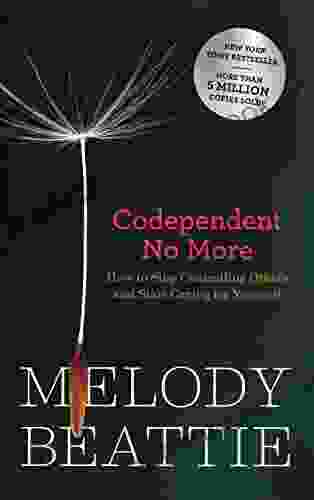How to Stop Controlling Others and Start Caring for Yourself

Controlling others is a common way to feel powerful and in control, but it can also be damaging to both you and the people you care about. When you try to control others, you are not respecting their autonomy or their right to make their own choices. You are also putting your own needs above theirs, which can lead to resentment and conflict.
4.7 out of 5
| Language | : | English |
| File size | : | 2430 KB |
| Text-to-Speech | : | Enabled |
| Enhanced typesetting | : | Enabled |
| Word Wise | : | Enabled |
| Print length | : | 308 pages |
| Screen Reader | : | Supported |
If you find yourself trying to control others, it is important to take a step back and ask yourself why. Are you feeling insecure or threatened? Do you feel like you need to be in control in order to feel safe or loved? Once you understand the reasons why you are trying to control others, you can start to work on changing your behavior.
Here are some tips on how to stop controlling others and start caring for yourself:
- Recognize that you are not responsible for other people's behavior. You can only control your own thoughts, words, and actions. Trying to control others is a futile and frustrating endeavor.
- Respect other people's boundaries. This means giving them the space and freedom to make their own choices, even if you don't agree with them. It also means not trying to manipulate or guilt them into ng what you want.
- Focus on your own needs and well-being. When you are focused on taking care of yourself, you are less likely to feel the need to control others. Make time for activities that you enjoy, and set boundaries to protect your time and energy.
- Learn to communicate your needs assertively. This means being able to express your thoughts and feelings in a direct and respectful way. When you communicate your needs assertively, you are more likely to get them met without resorting to controlling behavior.
- Seek professional help if needed. If you are struggling to stop controlling others on your own, a therapist can help you understand the underlying causes of your behavior and develop healthier coping mechanisms.
Caring for yourself is not about being selfish or self-centered. It is about taking care of your own needs so that you can be a healthier, happier, and more productive person. When you care for yourself, you are also better able to care for others in a healthy and supportive way.
Here are some tips for caring for yourself:
- Eat a healthy diet. Eating nutritious foods will give you the energy you need to get through the day and feel your best.
- Get regular exercise. Exercise is a great way to reduce stress, improve your mood, and boost your overall health.
- Get enough sleep. Most adults need around 7-8 hours of sleep per night. Getting enough sleep will help you to function at your best and avoid feeling tired and irritable.
- Spend time with loved ones. Social connections are important for our mental and physical health. Make time to spend with friends and family, and nurture your relationships.
- Do something you enjoy every day. Whether it's reading, listening to music, or spending time in nature, make time for activities that you enjoy. ng something you enjoy can help to reduce stress and improve your mood.
Caring for yourself is an ongoing process. There will be times when you slip up, but don't be discouraged. Just pick yourself up and keep trying. The more you practice caring for yourself, the better you will become at it. And the better you become at caring for yourself, the less you will feel the need to control others.
4.7 out of 5
| Language | : | English |
| File size | : | 2430 KB |
| Text-to-Speech | : | Enabled |
| Enhanced typesetting | : | Enabled |
| Word Wise | : | Enabled |
| Print length | : | 308 pages |
| Screen Reader | : | Supported |
Do you want to contribute by writing guest posts on this blog?
Please contact us and send us a resume of previous articles that you have written.
 Top Book
Top Book Novel
Novel Fiction
Fiction Nonfiction
Nonfiction Literature
Literature Paperback
Paperback Hardcover
Hardcover E-book
E-book Audiobook
Audiobook Bestseller
Bestseller Classic
Classic Mystery
Mystery Thriller
Thriller Romance
Romance Fantasy
Fantasy Science Fiction
Science Fiction Biography
Biography Memoir
Memoir Autobiography
Autobiography Poetry
Poetry Drama
Drama Historical Fiction
Historical Fiction Self-help
Self-help Young Adult
Young Adult Childrens Books
Childrens Books Graphic Novel
Graphic Novel Anthology
Anthology Series
Series Encyclopedia
Encyclopedia Reference
Reference Guidebook
Guidebook Textbook
Textbook Workbook
Workbook Journal
Journal Diary
Diary Manuscript
Manuscript Folio
Folio Pulp Fiction
Pulp Fiction Short Stories
Short Stories Fairy Tales
Fairy Tales Fables
Fables Mythology
Mythology Philosophy
Philosophy Religion
Religion Spirituality
Spirituality Essays
Essays Critique
Critique Commentary
Commentary Glossary
Glossary Bibliography
Bibliography Index
Index Table of Contents
Table of Contents Preface
Preface Introduction
Introduction Foreword
Foreword Afterword
Afterword Appendices
Appendices Annotations
Annotations Footnotes
Footnotes Epilogue
Epilogue Prologue
Prologue Nadia Nak
Nadia Nak Molly Huddle
Molly Huddle Anuschka Rees
Anuschka Rees Eve Ensler
Eve Ensler Ines Bridges
Ines Bridges Rena Sims
Rena Sims Judy Converse
Judy Converse Kara B Imle
Kara B Imle J R Rain
J R Rain William Blake
William Blake Jenny Hung
Jenny Hung Danielle Younge Ullman
Danielle Younge Ullman Alex Lake
Alex Lake Tiffany Brice Ferguson
Tiffany Brice Ferguson Cole Swensen
Cole Swensen J J Zerr
J J Zerr Frederick M Hess
Frederick M Hess Leslie Becker Phelps Phd
Leslie Becker Phelps Phd Bruce Carlley
Bruce Carlley Linnea Tanner
Linnea Tanner
Light bulbAdvertise smarter! Our strategic ad space ensures maximum exposure. Reserve your spot today!

 Brian BellThe Good Housekeeping Cookbook: 200 Triple-Tested Recipes for Every Meal and...
Brian BellThe Good Housekeeping Cookbook: 200 Triple-Tested Recipes for Every Meal and... Victor TurnerFollow ·16.5k
Victor TurnerFollow ·16.5k Julian PowellFollow ·19.5k
Julian PowellFollow ·19.5k Rudyard KiplingFollow ·19.6k
Rudyard KiplingFollow ·19.6k Mark MitchellFollow ·11.7k
Mark MitchellFollow ·11.7k Ernesto SabatoFollow ·3.8k
Ernesto SabatoFollow ·3.8k Garrett PowellFollow ·12.4k
Garrett PowellFollow ·12.4k Scott ParkerFollow ·17.5k
Scott ParkerFollow ·17.5k Chad PriceFollow ·18.7k
Chad PriceFollow ·18.7k

 Vincent Mitchell
Vincent MitchellUnveiling the Enchanting Tale of Plant Reproduction: A...
Plants, the silent yet vibrant...

 Sam Carter
Sam CarterDelve into the Enigmatic World of "Relative Murder: A...
In the realm of mystery and suspense, the...

 Richard Simmons
Richard SimmonsThe Sound Reinforcement Handbook: A Comprehensive Guide...
In the realm of live sound engineering, The...

 Leo Tolstoy
Leo TolstoyEnter the New Era of Cyberwar: Unmasking the Kremlin's...
`` Prologue: The Digital...

 Brenton Cox
Brenton CoxFirst Lessons Ukulele Bridget Baker: A Comprehensive...
Embarking on a musical journey with the...
4.7 out of 5
| Language | : | English |
| File size | : | 2430 KB |
| Text-to-Speech | : | Enabled |
| Enhanced typesetting | : | Enabled |
| Word Wise | : | Enabled |
| Print length | : | 308 pages |
| Screen Reader | : | Supported |












